Sirat to Eddington and Sentimental Value: The 12 Cannes films you need to know about
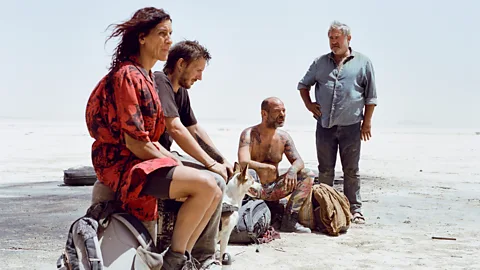
This year's Cannes Film Festival finishes today – and from the hundreds of titles that premiered, here are the ones which are going to be big talking points all through 2025.
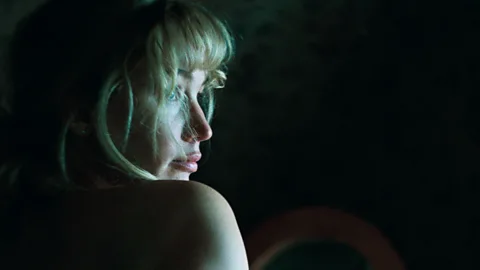
1. Die, My Love
With the combined star power of Jennifer Lawrence and Robert Pattinson and the arthouse credentials of acclaimed Scottish film-maker Lynne Ramsay (Morvern Callar, We Need to Talk about Kevin), Die, My Love was one of the most eagerly anticipated titles going into Cannes, where it sold to Mubi for $24m (£17.8m). Adapted from a 2017 novel by Ariana Harwicz, it sees Lawrence and Pattinson play a loved-up couple whose relationship unravels after a move to the countryside and the birth of their baby, and centres on the psychotic breakdown of Lawrence's character. At a festival event, Ramsay criticised journalists' read of the film as purely about postpartum psychosis, however, saying it was instead "about a relationship breaking down, it's about love breaking down, and sex breaking down after having a baby. And it's also about a creative block". Critics praised the cast in particular, which includes Sissy Spacek, LaKeith Stanfield and Nick Nolte – but the film belongs to Lawrence's raw, sensual-but-humorous performance. "What Lawrence does in Die, My Love is so delicately textured, even within its bold expressiveness, and its fiery anger, that it leaves you scrambling for adjectives," writes Stephanie Zacharek in Time, while the BBC's Nicholas Barber calls her "better than ever". (RL)
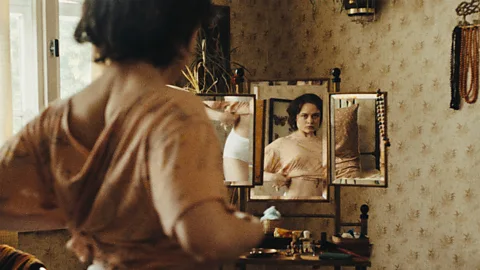
2. Sound of Falling
Even by Cannes' standards, Sound of Falling is an extraordinarily ambitious, richly textured and beautiful work of art. Mascha Schilinski's second feature film is all set in and around the same farmhouse in Germany, but it slips between four different time periods. We see the same characters as young children and as old people; we hear the traumas that echo through the generations. It can be challenging to figure out how everyone is connected to everyone else, and in some ways Sound of Falling is more reminiscent of a novel than a typical film. But Schilinski conjures up haunting, immersive effects that are only possible on the big screen. "Cinema is too small a word for what this sprawling yet intimate epic achieves in its ethereal, unnerving brilliance," said Damon Wise in Deadline. Forget Cannes, forget the Competition, forget the whole year, even – Sound of Falling is an all-timer." (NB)
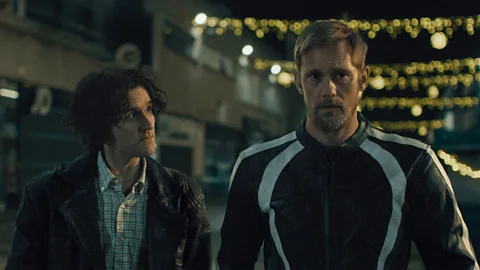
3. Pillion
Arguably, no film had a more striking premise this year than this British feature playing in the Un Certain Regard sidebar: a gay BDSM romance, featuring Hollywood star Alexander Skarsgård as Ray, a "dom", leather-clad biker living in the London suburbs who finds a "sub" in the form of adorkable car park inspector Colin, played by Harry Potter star Harry Melling. But the film itself was no mere provocation, instead providing a sharply observed and creditably knotty inquiry into such a relationship. Initially, as the inexperienced, nerdy Colin is thrust into a whole new world of sexual transgression, the film seems to occupy classic Brit-com territory in its quirky, farcical tone, despite the boundary-pushing subject matter. But it also darkens as it goes on, leaving the audience to reflect on whether such degrading role-play is plain emotional abuse; events reach a climax with an electric, excruciating lunch scene, in which Colin's mother (a brilliant Lesley Sharp) confronts Ray about his treatment of her son. Some reviewers such as David Rooney in The Hollywood Reporter found it "unexpectedly sweet" though for me, it was far more troubling than that – a sign, perhaps, of the kind of divided opinions that it may inspire when it is unleashed on the general public. (HM)
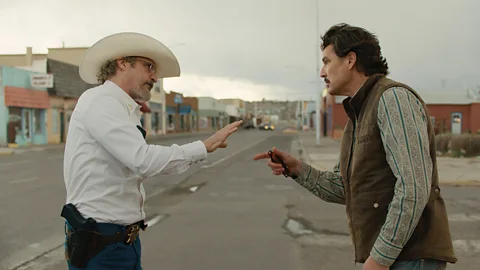
4. Eddington
A wild and chaotic comedy thriller from Ari Aster, the director of Hereditary and Midsommar, Eddington stars Joaquin Phoenix as a bungling small-town sheriff who imagines himself to be the straight-talking hero of his story, but might just be its devious and detestable villain. The setting is New Mexico in 2020. Aster pokes despairing fun at the ways Americans reacted to the Covid-19 pandemic, the Black Lives Matter protests, and the other events that defined that strange year, making this one of the only major US films to grapple with so many divisive contemporary political issues. Pedro Pascal, Emma Stone and Austin Butler co-star in what Sophie Monks Kaufman of the Independent called "Aster's funniest film to date". The "well-observed" Eddington "has a sweep that shows that the Wild West still exists on the ground and online," she writes, "and a keen eye for the people that grow in a sandy, mountain-flanked, lonely landscape". (NB)
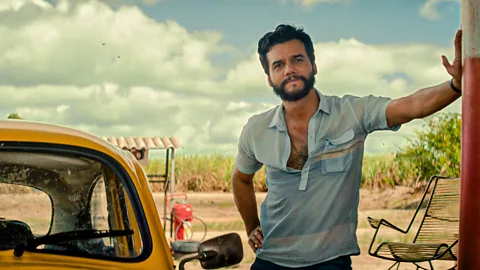
5. The Secret Agent
Kleber Mendonça Filho's 1977 Brazil-set thriller about a man on the run is one of the favourites to scoop Cannes' top honour, the Palme d'Or. Looking ahead, it looks likely to follow in the footsteps of I'm Still Here, another film set under the Brazilian dictatorship of the 1970s, which won the Oscar for best international film at the 2025 Academy Awards. At two hours and 40 minutes, The Secret Agent takes its sweet time to unravel, before an exhilarating and bloody final chase and a poignant coda that echoes I'm Still Here in its reflection on the legacy of this turbulent period in Brazil's history. The sympathetic protagonist, Marcelo, is played by Wagner Moura, in a charismatic performance that is tipped for acting nods come awards season. In his five-star review, The Guardian's Peter Bradshaw writes: "The Secret Agent doesn't have the imperatives of a conventional thriller and expecting these will cause impatience. It's more novelistic in its way: a movie of character, a showcase for Moura's complex, sympathetic performance but also the platform for some thrilling, bravura film-making." (RL)
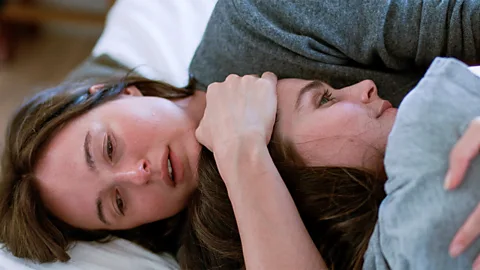
6. Sentimental Value
Joaquin Trier's The Worst Person in the World was a smash at Cannes in 2021, and went on to be nominated for two Oscars. Now the Norwegian director is back with another insightful comedy drama set in Oslo, with the same luminous star, Renate Reinsve. In Sentimental Value, she plays a famous theatre and television actress. Her obnoxiously self-centred father, played by Stellan Skarsgard, is a heavyweight film director, but he hasn't been able to raise money for a new project in 15 years. Could that be why he has written a screenplay especially for his celebrated daughter? Or could the proposed film be a sincere effort to fix the problems between them? "On its surface, the film may touch on the familiar theme of how artists draw from their own lives," said Tim Grierson in Screen International, "but Renate Reinsve and Stellan Skarsgard bring incredible tenderness to a story that is ultimately about what children and parents never say to one another." (NB)

7. Sirat
For all the projects with big name talent involved, one of the real joys of Cannes is when films that came into the festival as relatively unknown quantities finish it as major talking points, thanks to their sheer bold, bonkers brilliance. Such has been the case this year with Sirat, Spanish director Oliver Laxe's first film in the main competition, which has left people equal parts enraptured and stressed, even as they have struggled to explain what it’s all about. But here goes: beginning at a Moroccan desert rave, whose increasing sketchiness sets the skew-whiff tone, it focuses on a father looking for his missing daughter. As military forces come to break up the gathering, an apocalyptic element is introduced to the story, before the story morphs into a touching road movie, as the father and his young son join a merry band of hedonists driving through the mountains on their way to another event. But then a series of shocking twists change everything, turning this into an existential drama, with blackly comic edges, that is part Mad Max, part Samuel Beckett – or as Jessica Kiang in Variety called it, a "brilliantly bizarre, cult-ready vision of human psychology tested to its limits". With its earth-shattering techno-flavoured sound design and awe-inspiring cinematography of the arid North African landscape, this is also, it should be noted, the most ravishingly epic of this year's entrants – and that combined with its shock factor could well make it a watercooler film beyond the festival circuit. (HM)
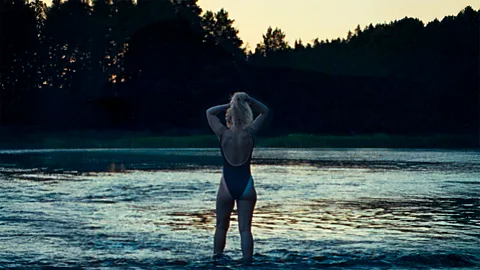
8. The Chronology of Water
Ever since shooting straight to the top of the A-list with Twilight, Kristen Stewart has made intelligent, challenging choices with her career, largely eschewing blockbusters for daring, imaginative arthouse projects. So it's no surprise really that her first film behind the camera should have proved to be such a deeply-felt work, in its exploration of womanhood and trauma, marking her out as a film-maker of real vision. Based on a memoir by writer Lidia Yuknavitch – played by a blazing, no-holds-barred Imogen Poots – it tells a powerful story of her struggle to process her pain through art, taking in her abusive childhood, battles with drugs and a heartrending stillbirth among other things. Except, as signalled by the title, nothing is in traditional narrative order: rather Stewart attempts to immerse us in Yuknavitch's consciousness via a fragmentary collage of images and life moments. As David Fear in Rolling Stone says, the result is "radical, bruising, and aggressive in its honesty" – even if sometimes, you wish Stewart would allow for some more conventional scenes to play out, to better appreciate the strong supporting performances in particular, including Thora Birch as Yuknavitc's grounding sister and Jim Belushi as her mentor, One Flew Over the Cuckoo's Nest author Ken Kesey. But its more impressionistic power means it's the kind of film that lingers with, and haunts you, well after the credits have rolled – and, for that reason, as well as its director's popularity, it could well pick up a devoted fanbase. (HM)
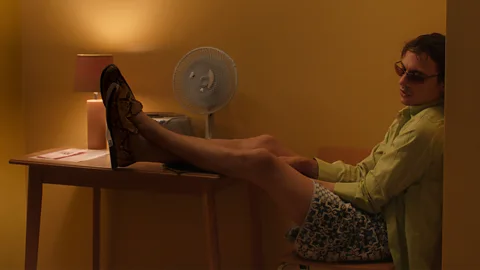
9. Urchin
One theme at this year's festival was well-received films made by actors who were trying their hand at being writer-directors. Alongside Scarlett Johansson and Kristen Stewart, Harris Dickinson (Babygirl) made his behind-the-camera debut with Urchin, a sharp, slyly comic drama about a middle-class young man (Frank Dillane) who has been a homeless drug addict for years. It's a daring film, in that it doesn't try to make its protagonist likeable, nor does it explain how someone from a well-off background ended up on the streets. Dickinson is typically impressive when he turns up in a few scenes himself, but Urchin suggests that he could do as much directing as acting from now on. His previous roles "appear to have functioned as an informal film school", says David Rooney in The Hollywood Reporter, "equipping him to tackle a much-trafficked subject in ways that are thoughtful, distinctive and clearly culled from close study of a highly specific world." (NB)
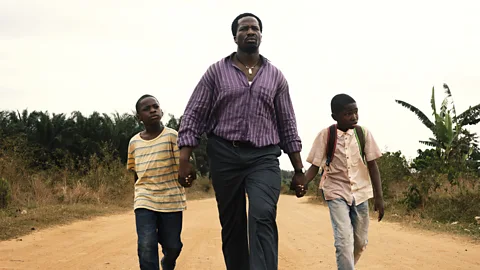
10. My Father's Shadow
Cannes may certainly be the premier platform for world cinema as a whole, but not every part of the globe is equally represented – and it certainly comes as a shock that this year's edition is the first ever to play host to a Nigerian film in its official selection. Certainly, though, after the impact My Father's Shadow made on the Croisette, you'd hope to see plenty more Nigerian entries following in its footsteps in coming years: Akinola Davies Jr's debut feature was received with universal warmth, offering a beautiful, poignant depiction of childhood memory, set against a crux point in the country's history in the early '90s. The focus is on two young boys, who are taken by their frequently absent but beloved father Folarin (Ṣọpẹ́ Dìrísù) on a trip into the Nigerian capital Lagos – on the very same day that the country's first democratic elections in 10 years are set to anoint a president. What follows is a vibrant, richly-textured and finally powerfully melancholic portrait of a parent and child snatching precious time together amid a society on the edge. As The Telegraph's Tim Robey said in his five star review: "The film is magically nimble, encompassing so much life so pithily in a day. It dreams of a future – for country and family – and mourns the theft of what might have been." (HM)
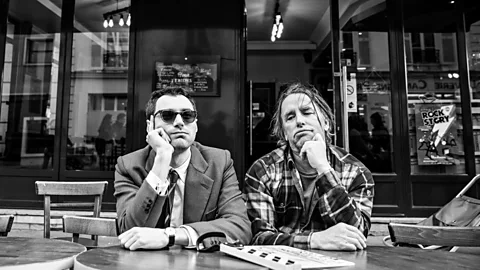
11. Nouvelle Vague
Richard Linklater's tribute to auteur Jean-Luc Godard is a peek-behind-the-scenes of the making of Godard's classic 1960 crime caper Breathless (À bout de souffle). A love letter to French cinema, the Cahiers du Cinéma writers group and the revolutionary 1960s "new wave", Linklater's film could have been tailor-made for the Cannes Film Festival – it even features a few Cannes in-jokes that provoked indulgent smirks in screenings. Linklater's film is a light confection, but an expertly executed one – from its uncanny casting (Guillaume Marbeck as Godard, Aubry Dullin as Jean-Paul Belmondo and Zoey Deutch as Jean Seberg are all perfect) to its propulsive, jazzy score. "A labour of love and a product of considerable craft…" writes Ben Croll in The Wrap, "[Nouvelle Vague is] more than just a valentine to the French New Wave; the film is also a stealth showcase for a film-maker rarely heralded (or for that matter, tribuned) for his technical sophistication." (RL)
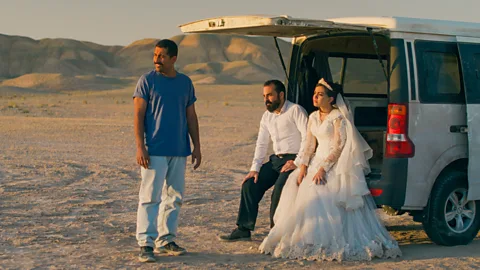
12. It Was Just an Accident
Never mind Tom Cruise. As far as cinephiles were concerned, one of the Cannes' biggest events was the presence of Jafar Panahi. In the past, Iran's regime has banned the beloved director from making films and from travelling, so it was a cause for celebration that he was able to come to the festival – and to bring an excellent new film with him. It Was Just an Accident is a farcical revenge thriller about a group of ordinary citizens who think they have found the interrogator who tortured them when they were in prison, but who can't be certain that they've got the right man. The film is fuelled by rage at the brutality of Iran's dictatorship, but is miraculously humane and funny, too. Peter Bradshaw in the Guardian said, "It's another very impressive serio-comic film from one of the most distinctive and courageous figures in world cinema." (NB)
--
If you liked this story, sign up for The Essential List newsletter – a handpicked selection of features, videos and can't-miss news, delivered to your inbox twice a week.
